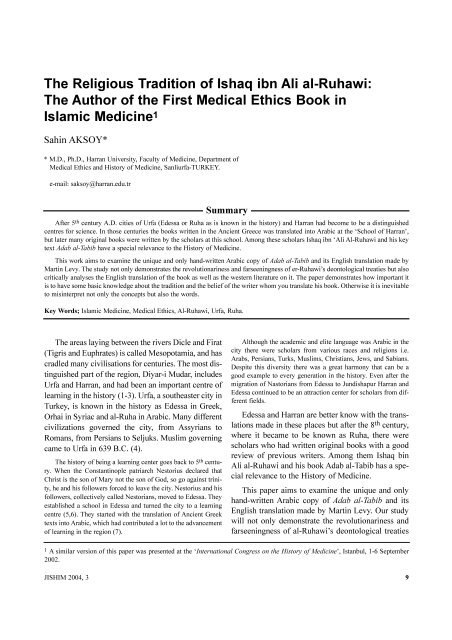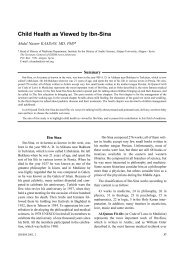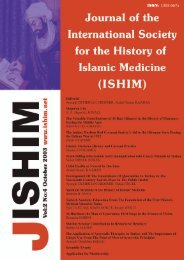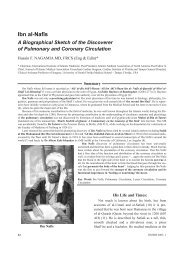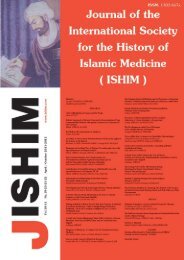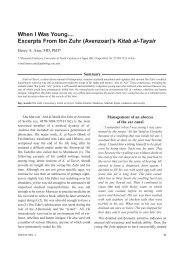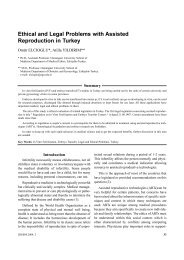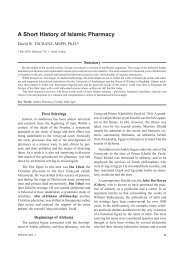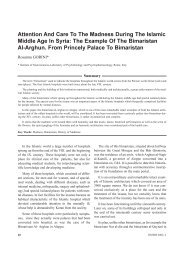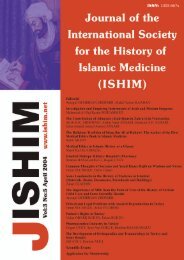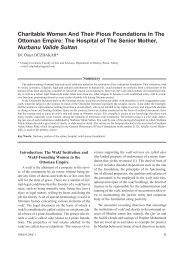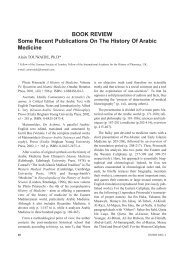The Religious Tradition of Ishaq ibn Ali al-Ruhawi - International ...
The Religious Tradition of Ishaq ibn Ali al-Ruhawi - International ...
The Religious Tradition of Ishaq ibn Ali al-Ruhawi - International ...
You also want an ePaper? Increase the reach of your titles
YUMPU automatically turns print PDFs into web optimized ePapers that Google loves.
<strong>The</strong> <strong>Religious</strong> <strong>Tradition</strong> <strong>of</strong> <strong>Ishaq</strong> <strong>ibn</strong> <strong>Ali</strong> <strong>al</strong>-<strong>Ruhawi</strong>:<br />
<strong>The</strong> Author <strong>of</strong> the First Medic<strong>al</strong> Ethics Book in<br />
Islamic Medicine 1<br />
Sahin AKSOY*<br />
* M.D., Ph.D., Harran University, Faculty <strong>of</strong> Medicine, Department <strong>of</strong><br />
Medic<strong>al</strong> Ethics and History <strong>of</strong> Medicine, Sanliurfa-TURKEY.<br />
e-mail: saksoy@harran.edu.tr<br />
Summary<br />
After 5 th century A.D. cities <strong>of</strong> Urfa (Edessa or Ruha as is known in the history) and Harran had become to be a distinguished<br />
centres for science. In those centuries the books written in the Ancient Greece was translated into Arabic at the ‘School <strong>of</strong> Harran’,<br />
but later many origin<strong>al</strong> books were written by the scholars at this school. Among these scholars <strong>Ishaq</strong> <strong>ibn</strong> ‘<strong>Ali</strong> Al-<strong>Ruhawi</strong> and his key<br />
text Adab <strong>al</strong>-Tabib have a speci<strong>al</strong> relevance to the History <strong>of</strong> Medicine.<br />
This work aims to examine the unique and only hand-written Arabic copy <strong>of</strong> Adab <strong>al</strong>-Tabib and its English translation made by<br />
Martin Levy. <strong>The</strong> study not only demonstrates the revolutionariness and farseeningness <strong>of</strong> er-<strong>Ruhawi</strong>’s deontologic<strong>al</strong> treaties but <strong>al</strong>so<br />
critic<strong>al</strong>ly an<strong>al</strong>yses the English translation <strong>of</strong> the book as well as the western literature on it. <strong>The</strong> paper demonstrates how important it<br />
is to have some basic knowledge about the tradition and the belief <strong>of</strong> the writer whom you translate his book. Otherwise it is inevitable<br />
to misinterpret not only the concepts but <strong>al</strong>so the words.<br />
Key Words; Islamic Medicine, Medic<strong>al</strong> Ethics, Al-<strong>Ruhawi</strong>, Urfa, Ruha.<br />
<strong>The</strong> areas laying between the rivers Dicle and Firat<br />
(Tigris and Euphrates) is c<strong>al</strong>led Mesopotamia, and has<br />
cradled many civilisations for centuries. <strong>The</strong> most distinguished<br />
part <strong>of</strong> the region, Diyar-i Mudar, includes<br />
Urfa and Harran, and had been an important centre <strong>of</strong><br />
learning in the history (1-3). Urfa, a southeaster city in<br />
Turkey, is known in the history as Edessa in Greek,<br />
Orhai in Syriac and <strong>al</strong>-Ruha in Arabic. Many different<br />
civilizations governed the city, from Assyrians to<br />
Romans, from Persians to Seljuks. Muslim governing<br />
came to Urfa in 639 B.C. (4).<br />
<strong>The</strong> history <strong>of</strong> being a learning center goes back to 5 th century.<br />
When the Constantinople patriarch Nestorius declared that<br />
Christ is the son <strong>of</strong> Mary not the son <strong>of</strong> God, so go against trinity,<br />
he and his followers forced to leave the city. Nestorius and his<br />
followers, collectively c<strong>al</strong>led Nestorians, moved to Edessa. <strong>The</strong>y<br />
established a school in Edessa and turned the city to a learning<br />
centre (5,6). <strong>The</strong>y started with the translation <strong>of</strong> Ancient Greek<br />
texts into Arabic, which had contributed a lot to the advancement<br />
<strong>of</strong> learning in the region (7).<br />
Although the academic and elite language was Arabic in the<br />
city there were scholars from various races and religions i.e.<br />
Arabs, Persians, Turks, Muslims, Christians, Jews, and Sabians.<br />
Despite this diversity there was a great harmony that can be a<br />
good example to every generation in the history. Even after the<br />
migration <strong>of</strong> Nastorians from Edessa to Jundishapur Harran and<br />
Edessa continued to be an attraction center for scholars from different<br />
fields.<br />
Edessa and Harran are better know with the translations<br />
made in these places but after the 8 th century,<br />
where it became to be known as Ruha, there were<br />
scholars who had written origin<strong>al</strong> books with a good<br />
review <strong>of</strong> previous writers. Among them <strong>Ishaq</strong> bin<br />
<strong>Ali</strong> <strong>al</strong>-<strong>Ruhawi</strong> and his book Adab <strong>al</strong>-Tabib has a speci<strong>al</strong><br />
relevance to the History <strong>of</strong> Medicine.<br />
This paper aims to examine the unique and only<br />
hand-written Arabic copy <strong>of</strong> Adab <strong>al</strong>-Tabib and its<br />
English translation made by Martin Levy. Our study<br />
will not only demonstrate the revolutionariness and<br />
farseeningness <strong>of</strong> <strong>al</strong>-<strong>Ruhawi</strong>’s deontologic<strong>al</strong> treaties<br />
1 A similar version <strong>of</strong> this paper was presented at the ‘Internation<strong>al</strong> Congress on the History <strong>of</strong> Medicine’, Istanbul, 1-6 September<br />
2002.<br />
JISHIM 2004, 3<br />
9
Sahin AKSOY<br />
but <strong>al</strong>so show how important it is to have some basic<br />
knowledge about the tradition and the belief <strong>of</strong> the<br />
writer whom you translate his book. Otherwise it is<br />
inevitable to misinterpret not only the concepts but<br />
<strong>al</strong>so the words. We intend to critic<strong>al</strong>ly an<strong>al</strong>yse the<br />
English translation <strong>of</strong> the book as well as the western<br />
literature on it, so to come to a reliable conclusion.<br />
Unfortunately, not much is known about <strong>Ishaq</strong> bin <strong>Ali</strong> <strong>al</strong>-<br />
<strong>Ruhawi</strong>. He is mentioned only in an indirect fashion in Ibn abi<br />
Usaibi’a’s biographic dictionary ‘Uyun <strong>al</strong>-Anba’. We know that<br />
he lived in Ruha at the end <strong>of</strong> 9th century. He wrote 3 books other<br />
than Adab <strong>al</strong>-Tabib. 1) A compilation <strong>of</strong> first 4 books <strong>of</strong><br />
Alexandrian Canons; 2) Introduction to Di<strong>al</strong>ectics for Beginners<br />
and 3) On Examination <strong>of</strong> Physicians (8). Literature available<br />
about <strong>al</strong>-<strong>Ruhawi</strong> in this century is very limited. <strong>The</strong>y are only<br />
Levey’s articles (9,10), Bürgel’s chapters(8,11) and Sezgin’s<br />
book on the ‘History <strong>of</strong> Arabic Literature’ (12). In fact we are<br />
thankful to <strong>al</strong>l these writers for introducing us such an important<br />
scholar and his work. Especi<strong>al</strong>ly Levey’s English translation <strong>of</strong><br />
the Adab <strong>al</strong>-Tabib was a significant contribution to medic<strong>al</strong> history<br />
literature. However with <strong>al</strong>l due respect to Levey and his<br />
work, we believe that it is a duty for us to re-examine his translation<br />
and define the points that we think he made some mistakes,<br />
intention<strong>al</strong>ly or unintention<strong>al</strong>ly, in interpreting <strong>al</strong>-<strong>Ruhawi</strong>.<br />
While Levey was introducing <strong>al</strong>-<strong>Ruhawi</strong> in his book, in the<br />
second sentence he wrote;<br />
“Al-<strong>Ruhawi</strong> was probably from Ruha, a city in<br />
Northwest Mesopotamia. It is <strong>al</strong>so known that <strong>al</strong>-<br />
<strong>Ruhawi</strong> was a Christian” (10).<br />
Although the religious affiliation <strong>of</strong> a scholar may not be relevant<br />
or important for some people, it must be imperative for<br />
Levey that he mentioned this in his very first sentences.<br />
Nevertheless it is not unique to Levey, <strong>al</strong>so Bürgel tells about <strong>al</strong>-<br />
<strong>Ruhawi</strong>’s religious affiliation in the introduction part <strong>of</strong> both <strong>of</strong><br />
his articles (8,11), and he writes <strong>al</strong>-<strong>Ruhawi</strong> was a Jewish. We do<br />
not wish to be perceived as religious take-siders but both <strong>of</strong> these<br />
information are needed to be re-ev<strong>al</strong>uated since, at least one <strong>of</strong><br />
them is wrong, if not both.<br />
None <strong>of</strong> the authors give any evidence why they think he was<br />
a Christian, or a Jewish. We do not want to assume that it was a tradition<strong>al</strong><br />
reflex <strong>of</strong> a western orient<strong>al</strong>ist medic<strong>al</strong> historian just not to<br />
give the credit <strong>of</strong> a v<strong>al</strong>uable medic<strong>al</strong> text to a Muslim scholar. We<br />
wish they live and answer this question. Since they cannot speak<br />
for themselves contemporary medic<strong>al</strong> historians like Dr. Lawrance<br />
Conrad, who <strong>al</strong>so suggests that <strong>al</strong>-<strong>Ruhawi</strong> was a Christian, may<br />
enlighten us.<br />
Anyone who reads the Arabic origin<strong>al</strong> <strong>of</strong> the book (13), or<br />
even read the English translation <strong>of</strong> it, without looking at the<br />
footnotes can easily understand that <strong>al</strong>-<strong>Ruhawi</strong> was a learned<br />
Muslim scholar. Al-<strong>Ruhawi</strong> begins his book with the words;<br />
“In the name <strong>of</strong> Allah, the Beneficent and the<br />
Compassionate in Whom I have trust and for<br />
Whose help I ask”<br />
THE RELIGIOUS TRADITION OF ISHAQ IBN ALI AL-RUHAWI:<br />
THE AUTHOR OF THE FIRST MEDICAL ETHICS BOOK IN ISLAMIC MEDICINE<br />
Every medic<strong>al</strong> historians who has some basic knowledge<br />
about history <strong>of</strong> Islamic Science knows that this is a very typic<strong>al</strong><br />
introduction for a Muslim writer. We can argue that it is not possible<br />
to find any non-Muslim writer in the history who starts his<br />
book the way <strong>al</strong>-<strong>Ruhawi</strong> starts, since this is not familiar to non-<br />
Muslim world.<br />
Al-<strong>Ruhawi</strong> use the word ‘Allah’ hundreds <strong>of</strong> time in his<br />
book, though Levey mostly prefer to translate it as God, and the<br />
other names and attributes <strong>of</strong> Allah, like Ex<strong>al</strong>ted, Beneficent,<br />
Compassionate, Life Giver, He<strong>al</strong>er, Creator, etc. As it is known<br />
that there are 99 names and attributes <strong>of</strong> Allah (Asma <strong>al</strong>-Husna)<br />
in Islamic understanding, which is not the case neither in<br />
Christianity, nor in Judaism. <strong>The</strong> frequent usage <strong>of</strong> these phrases<br />
is <strong>al</strong>so an evidence <strong>of</strong> <strong>al</strong>-<strong>Ruhawi</strong>’s religious belief. Levey, may be<br />
to strengthen his claim, tells in the very first footnote that<br />
“Use <strong>of</strong> the word Allah is not meant particularly to<br />
designate the Muslim idea <strong>of</strong> God. Further, the<br />
words Muslim, Arabic, and Islamic are gener<strong>al</strong>ly<br />
used synonymously to designate the period.”<br />
We see this as a useless effort since it is very obvious that the<br />
word Allah is meant, for an objective reader, to designate the<br />
Muslim idea <strong>of</strong> God.<br />
<strong>The</strong>re is another part <strong>of</strong> the text that leaves no doubt about the<br />
religious affiliation <strong>of</strong> <strong>al</strong>-<strong>Ruhawi</strong>. He writes in the introductory<br />
part <strong>of</strong> the first chapter that;<br />
“<strong>The</strong> first thing in which a physician must<br />
believe is that <strong>al</strong>l in this world has only one able<br />
creator who performs <strong>al</strong>l deeds wilfully.……<br />
<strong>The</strong> second article <strong>of</strong> faith in which a physician<br />
must believe is that he have credence in the great<br />
Allah with a firm affection, and is devoted to<br />
Him with <strong>al</strong>l his reason, soul, and free will.……<br />
<strong>The</strong> third faith which a physician must posses is<br />
that Allah sent His messengers to mankind to<br />
teach them what is good since the mind <strong>al</strong>one is<br />
not sufficient. Thus, without His apostles, it is not<br />
enough for man.……<br />
In <strong>al</strong>l these matters, the physician must truly<br />
believe since <strong>al</strong>l the holy books and ancients<br />
affirm them. No believer can deny them.”<br />
As it is apparent, <strong>al</strong>-<strong>Ruhawi</strong> summarizes exactly the five pillars<br />
<strong>of</strong> Islam. After this statement it is hard to understand why<br />
Levey and Bürgel suggest <strong>al</strong>-<strong>Ruhawi</strong> not to be a Muslim.<br />
Both authors use two things as an evidence to claim that <strong>al</strong>-<br />
<strong>Ruhawi</strong> was critic<strong>al</strong> to Islam. One <strong>of</strong> them is his statement on<br />
drinking wine. Norm<strong>al</strong>ly, it is assumed that a Muslim physician<br />
should not advise to drink <strong>al</strong>cohol. But <strong>al</strong>-<strong>Ruhawi</strong> writes that;<br />
“Wine is good both for the he<strong>al</strong>thy and ill. For<br />
he<strong>al</strong>thy people, it is quicker nourishment than<br />
other foods because <strong>of</strong> its quick ripening, its penetration<br />
into the liver, and its changing into….”<br />
10 JISHIM 2004, 3
THE RELIGIOUS TRADITION OF ISHAQ IBN ALI AL-RUHAWI:<br />
THE AUTHOR OF THE FIRST MEDICAL ETHICS BOOK IN ISLAMIC MEDICINE<br />
Sahin AKSOY<br />
“It is useful for the ailing if they use it appropriately,<br />
in moderation both in qu<strong>al</strong>ity and quantity.”<br />
<strong>The</strong>y rightly suggest, by looking at these statements that he is<br />
not a Muslim. But they fail to consider the following part <strong>of</strong> the<br />
statement wherein <strong>al</strong>-<strong>Ruhawi</strong> tells about the harmful affects <strong>of</strong><br />
wine. He says;<br />
“<strong>The</strong> damages are so great that the listing and<br />
description <strong>of</strong> them would be quite lengthy.<br />
When you investigate the harm and vice brought<br />
to victim, they are so abundant and apparent that<br />
even one who is not a physician is fully aware <strong>of</strong><br />
them. How many he<strong>al</strong>thy people it makes ill!<br />
How many kinds <strong>of</strong> death it causes! From the<br />
brain, it takes away its memory, corrupts its<br />
understanding and renders its imagination turbid!<br />
How much it dries up the nerves! How much it<br />
makes the limbs tremble and the senses weakened!<br />
How many kinds <strong>of</strong> evil changes it causes<br />
the soul in his sleep!.……<strong>The</strong>se are the end<br />
results <strong>of</strong> the vices <strong>of</strong> wine drinking and the end<br />
results <strong>of</strong> its addiction. This is so that you will<br />
understand the details which I do not see fit to<br />
discuss.”<br />
When we consider <strong>al</strong>-<strong>Ruhawi</strong>’s statement on wine in whole,<br />
it just indicates that he was an open-minded Muslim physician,<br />
who tells the good and bad sides <strong>of</strong> everything without paying<br />
any attention whether it is forbidden or encouraged in Islam. As<br />
a good physician his primary concern is nothing but to be benefici<strong>al</strong><br />
to the patients as well to protect the he<strong>al</strong>th <strong>of</strong> the people.<br />
Due to time constraints we will not be able to go further to<br />
exhibit other misinterpretations <strong>of</strong> Levey. But this is the subject<br />
<strong>of</strong> another article we are currently working on.<br />
As a conclusion it is possible to say that, Levey, Bürgel and<br />
other western medic<strong>al</strong> historians were wrong on religious affiliation<br />
<strong>of</strong> <strong>al</strong>-<strong>Ruhawi</strong>. Although the scientific and intellectu<strong>al</strong> contribution<br />
<strong>of</strong> a scholar is more important than his religious affiliation,<br />
both Levey and Bürgel misstate in their writings that <strong>al</strong>-<br />
<strong>Ruhawi</strong> was not a Muslim. <strong>The</strong>refore I want to take this as a duty<br />
to correct this mistake, for the sake <strong>of</strong> future medic<strong>al</strong> historians,<br />
and show the concrete evidences that he was a learned and openminded<br />
Muslim physician.<br />
REFERENCES<br />
1. Erdemir AD. Týbbi Deontoloji ve Genel Týp Tarihi (Medic<strong>al</strong><br />
Deontology and History <strong>of</strong> Medicine in Gener<strong>al</strong>). Bursa:<br />
Günes & Nobel, 1996:209-10.<br />
2. Kahya E, Erdemir AD. Bilimin Iþýðýnda Osmanlýdan<br />
Cumhuriyete Týp ve Saðlýk Kurumlarý (Medic<strong>al</strong> and He<strong>al</strong>th<br />
Foundations from Ottoman to Turkish Republic). Ankara:<br />
Turkish Religion Wakf Publication, 2000:21-42.<br />
3. Sarýkavak K. Düþünce Tarihinde Urfa ve Harran (Urfa and<br />
Harran in the History <strong>of</strong> Thought). Ankara: Turkish<br />
Religion Wakf Publication, 1997:1-20.<br />
4. Isýltan F. Urfa Bölgesi Tarihi (<strong>The</strong> History <strong>of</strong> Urfa Region).<br />
Ýstanbul, 1960:22-6.<br />
5. Rhodes P. An Outline History <strong>of</strong> Medicine. London:<br />
Butterworths, 1985:25.<br />
6. Guthrie D. A History <strong>of</strong> Medicine. London: Thomas Nelson<br />
and Sons Ltd., 1958:86.<br />
7. Coleman V. <strong>The</strong> Story <strong>of</strong> Medicine. London: Jill Norman<br />
Book, 1985:30.<br />
8. Bürgel J. Ch. Adab und i’tid<strong>al</strong> in ar-<strong>Ruhawi</strong>s adab at-Tabib.<br />
Zeitschrift der Deutschen Morgenländischen Gesellschaft,<br />
Band 117, Wiesbaden 1967:90-102.<br />
9. Levey M. Medic<strong>al</strong> Deontology in Ninth Century Islam. J.<br />
Hist Med 1966; 1:358:358-73.<br />
10. Levey M. Medic<strong>al</strong> Ethics <strong>of</strong> Mediev<strong>al</strong> Islam with Speci<strong>al</strong><br />
Reference to Al-<strong>Ruhawi</strong>’s “Practic<strong>al</strong> Ethics <strong>of</strong> the<br />
Physician. Philedelphia: <strong>The</strong> American Philosophic<strong>al</strong><br />
Society, 1967.<br />
11. Bürgel J. Ch. Die Bildung des Arztes, eine Arabische<br />
Schrift zum ‘ärztlichen Leben’ aus dem 9. Jahrhundert’.<br />
Sudh<strong>of</strong>fs Archiv, Band 50, Wiesbaden 1966:337-60.<br />
12. Sezgin F. Geschichte des Arabischen Schrifttums. Band III,<br />
E.J. Brill, Leiden, 1970:263-64.<br />
13. Al-<strong>Ruhawi</strong> I.A. Adab <strong>al</strong>-Tabib, Turkish Republic Ministry<br />
<strong>of</strong> Culture Selimiye Library, No: 1658.<br />
JISHIM 2004, 3<br />
11


